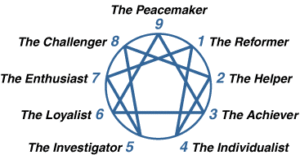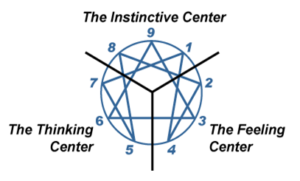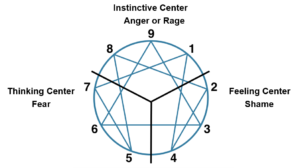“Harry Potter” and the Nine Personality Types
Enneagrams (from the Greek word ennea, meaning “nine”) are “models of human personality” that are interconnected and can be formed into a circular diagram. Or in plain English, it’s like a personality test with nine possible outcomes that are all related to one another in different ways. Naturally, upon reading about enneagrams, I wanted to see if I could assign a character from Harry Potter to each personality type.
First, here are a few things to know about Enneagrams. The simple way of looking at it is this: the theory is that there are nine different personalities. Take the test to find out yours here.

These nine types can be divided into three groups, called Centers. As stated by the Enneagram Institute, “Each Center consists of three personality types that have in common the assets and liabilities of that Center.”

In addition, each Center has a dominant emotion, meaning that “in each Center, the personalities of the types are particularly affected by that Center’s emotional theme.”

However, this system is more complicated than it appears. A person cannot be a pure personality type; we also have a wing, or a sub-type. Someone’s wing is typically one of the two types that are adjacent to their basic type on the circle chart above. For example, if I am a 4, then my wing is either type 3 or type 5, depending upon which is more like me. So if I am a 4 and my wing is 3, then my type would be written as “4w3”.
Read more on each personality type and scroll down to learn about Centers, Dominant Emotions, and Wings here.
After much thought over which characters would best fit each type, this is what I came up with!
Type 1 – “The Reformer”
“The Rational, Idealistic Type: Principled, Purposeful, Self-Controlled, and Perfectionistic.”
[Read more on Type 1]
Center: Instinctive
Dominant Emotion: Anger/Rage
Character: Hermione Granger
Wing for that Character: Type 2
Enneagram 1 with a 2-Wing: “The Advocate”
I believe that Hermione Granger best represents the type 1 personality. We see many cases of her logical thinking, perfectionism (her Boggart is Professor McGonagall telling her that she failed her exams, or failure in general, after all), and high principles and moral guidelines (“Madam Hooch told us not to move — you’ll get us all into trouble.” “A promise is a promise.”) throughout the series. She has a type 2 wing because of her caring, empathetic motivations (like her kindness to house-elves or how she always has “tears in her eyes” whenever she’s informed of a tragedy or injustice). Overall, this makes Hermione a 1w2, “The Advocate”.
The only thing that does not seem to fit Hermione is that her Center is “Instinctive” rather than “Thinking”, but maybe her rational nature allows her to act more out of instinct than thinking of a solution. I would also argue that we see Hermione feeling “Shameful” more often than “Angry”, but a lot of her motives stem from anger — anger at Trelawney causes her to quit Divination, anger at Wizarding society leads her to create “SPEW”, anger at Ron makes her ask Cormac McLaggen to Slughorn’s Christmas party, et cetera.
Type 2 – “The Helper”
“The Caring, Interpersonal Type: Generous, Demonstrative, People-Pleasing, and Possessive.”
[Read more on Type 2]
Center: Feeling
Dominant Emotion: Shame
Character: Molly Weasley
Wing for that Character: Type 1
Enneagram 2 with a 1-Wing: “The Servant”
Molly Weasley is a prime example of a type 2. She never stops nurturing and fussing at her seven kids; her generosity is present when she takes care of Harry like a mother and welcomes Hermione, Lupin, Tonks, and many others into her home; and killing Bellatrix Lestrange to protect her children are all examples of a true 2. Molly’s wing is type 1 because of her strict, follow-the-rules side, making her a 2w1 (oddly the inverse of Hermione) which is known as “The Servant”.
She is very much a “Feeling” person and her emotions drive her decisions more than reasoning. It took Molly a long time to accept Fleur into her family because of her own dislike of Fleur and protectiveness over Bill (regardless of what Bill had to say in the matter), which shows that she was acting from her feelings. As for “Shame”, I’m not certain that we see an explicit “shameful” moment for Molly in the series, but knowing her character I think that could be a dominant emotion – besides, her wing’s dominant emotion is anger and Molly Weasley is certainly capable of that.
Type 3 – “The Achiever”
“The Success-Oriented, Pragmatic Type: Adaptive, Excelling, Driven, and Image-Conscious.”
[Read more on Type 3]
Center: Feeling
Dominant Emotion: Shame
Character: Gilderoy Lockhart
Wing for that Character: Type 4
Enneagram 3 with a 4-Wing: “The Professional”
Gilderoy Lockhart will do almost anything to reach his goals, which makes him an exaggerated type 3. To say that he is success-oriented is an understatement; he ruined many wizards’ lives to achieve his high, heroic status. Lockhart’s vanity could be taken as image-conscious (wearing wigs to keep up appearances, for example) and he certainly is “excelling” in the field of identity theft. Type 4 is Lockhart’s wing because of his egoistical and melodramatic nature. This makes him a 3w4, “The Professional”.
I suppose you could argue that Lockhart is a “Feeling” person, though I personally believe that he is more logic-based in his actions as his schemes seem to be well-thought-out (he is a Ravenclaw, after all). I doubt that we would ever outwardly see Lockhart “Shameful”, so that’s another flaw in my case.
Type 4 – “The Individualist”
“The Sensitive, Introspective Type: Expressive, Dramatic, Self-Absorbed, and Temperamental.”
[Read more on Type 4]
Center: Feeling
Dominant Emotion: Shame
Character: Luna Lovegood
Wing for that Character: Type 5
Enneagram 4 with a 5-Wing: “The Bohemian”
The Enneagram Institute describes type 4’s as “emotionally honest, creative, and personal” – all of which describe the very avant-garde Luna Lovegood. She is reflective (“I believe He-Who-Must-Not-Be-Named is back, and I believe you fought him and escaped from him.”), outwardly expressive and open about her opinions, beliefs (“…Aurors are part of the Rotfang Conspiracy, I thought everyone knew that.”) and even in her clothing (“Luna was wearing what looked like a pair of orange radishes for earrings…”). Her wing is type 5, a “cerebral” and “perceptive” type; overall, a 4w5, which is known as “The Bohemian” (which is the perfect word to summarize Luna Lovegood).
Like I said for Lockhart, I consider Luna to be more of a “Thinker” than a “Feeler”, but luckily her wing type has a thinking Center. I’m not completely sold on “Shame” being her dominant emotion either, nor “self-absorbed” being one of her characteristics, but enneagrams cannot suit everyone perfectly.
Type 5 – “The Investigator”
“The Intense, Cerebral Type: Perceptive, Innovative, Secretive, and Isolated.”
[Read more on Type 5]
Center: Thinking
Dominant Emotion: Fear
Character: Severus Snape
Wing for that Character: Type 6
Enneagram 5 with a 6-Wing: “The Problem Solver”
To be honest, this was the most difficult of the 9 types for me to find a character that fits the description. For a while, I considered Hermione a good fit for this type, but the more I thought about it, the more I saw bits of Severus Snape’s personality. He is very much an introvert that has no interest in expressing his feelings (his relationship to Lily Evans, for example); an intellectual, as we see particularly from his “Half-Blood Prince” Potions textbook that he could invent spells, brew his own potions and understand what exactly makes a potion work all before he even graduated from Hogwarts; and Snape is probably the most covert character in the entire series. These all make him a good fit for type 5, and in addition, Snape’s wing is type 6 (conveniently titled “The Loyalist”) mainly because of his liability and general cynicism.
“Thinking” is a logical Center for Snape, however “Fear” as his Dominant Emotion (especially over Anger and Shame) does not convince me. Of course, Snape is capable of fear, but his hatefulness towards James Potter and implied internal guilt about Lily Potter’s death justify Anger and Shame, while there are not such bold examples of fear (largely due to the fact that Snape is so secretive about his emotions).
Type 6 – “The Loyalist”
“The Committed, Security-Oriented Type: Engaging, Responsible, Anxious, and Suspicious.”
[Read more on Type 6]
Center: Thinking
Dominant Emotion: Fear
Character: Ron Weasley
Wing for that Character: Type 7
Enneagram 6 with a 7-Wing: “The Buddy”
“The Loyalist” is an excellent title for Ron Weasley as his loyalty to his friends, family, and school is proven countless times (“If you want to kill Harry, you’ll have to kill us, too!”). Ron’s devotion to his friends still remains even after he abandoned Harry and Hermione in Deathly Hallows, stating later that he “…wanted to come back the minute [he] Disapparated.” One of Ron’s vices is his anxiety (or, more specifically, his inferiority complex), and out of him, Harry and Hermione, he seems to be the most skeptical (suspicious), especially in Deathly Hallows. His wing, type 7, suits his laid-back and humorous personality, all-in-all making him a 6w7, a.k.a. “The Buddy” (which is another perfect title for Ron).
Once again, the Center is where most of the problems lie. Ron is definitely rooted in his feelings rather than rationality. In the lecture Unlocking Deathly Hallows, John Granger says that the trio of Harry, Ron, and Hermione have a “symbolic meaning as body, mind, and spirit” (Ron being the “body”, Hermione being the “mind” and Harry being the “spirit”). With this statement, Granger claims that Ron Weasley is the allegorical “body”, or “heart” of the group, therefore his having a “Thinking” Center does not make sense.
Type 7 – “The Enthusiast”
“The Busy, Variety-Seeking Type: Spontaneous, Versatile, Acquisitive, and Scattered.”
[Read more on Type 7]
Center: Thinking
Dominant Emotion: Fear
Character: Fred and George Weasley
Wing for that Character: Type 7
Enneagram 7 with a 6-Wing: “The Entertainer”
Fred and George Weasley are a good fit for type 7 because of their light-hearted, optimistic, often-undisciplined behavior. Their pranks, rule-breaking, and carefree fun all fit into the characteristics of a 7. For their wing, I suppose that you could draw comparisons to type 6, but the twins are more likely to have a type 6 wing than type 7. So, assuming that they are do indeed have a type 6 wing, then that makes Fred and George type 7w6, “The Entertainer” (which is certainly true).
The thinking Center suits the twins because even Hermione admits in Order of the Phoenix that the magic they were using on their Weasley’s Wizard Wheezes was “clever”. Also, they know how to make a successful business all on their own, which requires skill and planning. I’m not sure about “Fear”, but I think that Fred and George use their extroverted, droll personalities to mask their fear and worry in hard times, like in Deathly Hallows when they continued to joke even when George lost an ear.
Type 8 – “The Challenger”
“The Powerful, Dominating Type: Self-Confident, Decisive, Willful, and Confrontational.”
[Read more on Type 8]
Center: Instinctive
Dominant Emotion: Anger/Rage
Character: Harry Potter
Wing for that Character: Type 9
Enneagram 8 with a 9-Wing: “The Bear”
Harry Potter, while he may not believe so himself, is a very powerful wizard (in many senses of the word) and has the will to stand up for his loved ones, school, and beliefs. Though as the reader, we see the world through Harry’s insecure eyes, taking a step back and analyzing Harry’s choices and actions reveal that he can be extremely resolute and have a strong leadership role at times. Nevertheless, Harry’s wing (type 9) is crucial to understanding his character, because much of his personality is his deferential nature and humility that reflects his recklessness and self-confidence nicely. 8w9’s like Harry are called “The Bear”.
Harry’s Center and Dominant Emotion describe him flawlessly. He acts instinctively – something that Hermione repeatedly scolds him for – and his anger at Voldemort, Bellatrix, and Dumbledore (among many others throughout the series) is never addressed passively; there is always a confrontation of sorts.
Type 9 – “The Peacemaker”
“The Easygoing, Self-Effacing Type: Receptive, Reassuring, Agreeable, and Complacent.”
[Read more on Type 9]
Center: Instinctive
Dominant Emotion: Anger/Rage
Character: Albus Dumbledore
Wing for that Character: Type 1
Enneagram 9 with a 1-Wing: “The Dreamer”
“The Peacemaker” is a title that Albus Dumbledore would have loved to achieve. His overarching plan for Harry throughout the series is (though its morality is debatable) for the sake of making peace in the Wizarding world. He is kind to his students and peers, even those who disobey or are rude to him, and even though he achieved great things in his lifetime, Dumbledore was always humble and the opposite of condescending. I believe that his wing would be type 1 because of how important the consideration of ethics is to him and how his ideas are always backed up by rationality. A 9w1 is known as “The Dreamer”.
My initial reaction to Dumbledore Center being “Instinctive” was that it was inaccurate; that thinking or even feeling would be better suited. However, the more I think about it, Dumbledore’s “instinct” could be to act based on what both his heart and his mind tell him to do; like a combination of those two. And though I cannot recall a time in the Harry Potter novels where we see Dumbledore outwardly angry, and shame seems to be a better fit for Dominant Emotion, as we do see Dumbledore shameful and guilty of his actions many times in the series.
All of these characters could’ve been assigned differently, and other characters than the ones that I listed can be placed onto the Enneagram types as well. I would love to know in the comments what your opinions are on my typing, and I encourage you to do more research on this fascinating topic!
Lastly, if you haven’t yet taken the “which type are you” test, you can find a free version of it here or take the Enneagram Institute test here – it’s a ton of fun!

